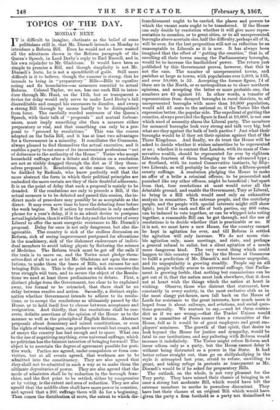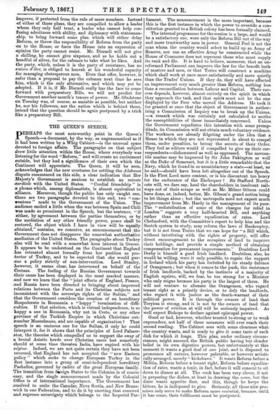TOPICS OF THE DAY.
MONDAY. NEXT.
IT is difficult to imagine, obstinate as the belief of some politicians still is, that Mr. Disraeli intends on Monday to introduce a Reform Bill. Even he would not so have wasted all the adroitness shown in the Reform paragraph of the Queen's Speech, in Lord Derby's reply to Earl Russell, and in his own rejoinder to Mr. Gladstone. It would have been so simple to promise a Bill, and though simplicity is not Mr. Disraeli's forte, he is not a spendthrift of guile. Still more difficult is it to believe, though the rumour is strong, that he intends to bring in "preparatory" Bills—Bills to equalize rating and fix boundaries—as measures essential to actual Reform. Colonel Taylor, we see, has one such Bill to intro- duce through Mr. Hunt, on the 1 1 th, but so transparent a device for delay would only serve to make Lord Derby's fall discreditable and compel his successors to dissolve, and sweep a strong Bill through by means hardly to be distinguished from force. The carefully worded sentences of the Queen's Speech, with their talk of " proposals " and mutual forbear- ances, must imply something else than a measure either preparatory or real, and that something can only be a pro- posal to "proceed by resolutions." This was the course adopted on the India Bill, and it has at least two advantages for a Government in a minority. It conciliates the Commons, always pleased to find themselves the actual executive, and it enables a party to eat some of its inconvenient professions "out of deference to the authority of the House." Tories who accept household suffrage after a debate and division on a resolution are not so visibly dragged through the dirt as if they them- selves proposed it. Resolutions, at the same time, can never be disliked by Radicals, who know perfectly well that the more abstract the form in which their political principles are embodied the more certain are they of their doubtful adherents. It is on the point of delay that such a proposal is mainly to be dreaded. If the resolutions are only to precede a Bill, if the actual measure is to be debated and passed this session, the in- direct mode of procedure may possibly be as acceptable as the direct. It may even save time to have the debating done before the work begins. But if action by resolutions is only another phrase for a year's delay, if it is an adroit device to postpone actual legislation, then it will be the dutyand the interest of every Liberal to offer the most energetic resistance to Mr. Disraeli's proposal. Delay for once is not only dangerous, but also dis- agreeable. The country is sick of the endless discussion on Reform, sick of seeing improvement postponed for alterations in the machinery, sick of the dishonest endeavours of indivi- dual members to avoid taking physic by flattering the science of Medicine. The Reform track must be got off the rails if the train is to move on, and the Tories must pledge them- selves first of all to act or let Mr. Gladstone act upon the reso- lutions, to make them the bases of Bills, not excuses for not bringing Bills in. This is the point on which we conceive the true struggle will turn, and to secure the object of the Resolu- tions we need at least three preliminaries to debate. First, a distinct pledge from the Government, too clear to be explained away, too formal to be retracted, that there shall be no delay between resolve and action. Secondly, a distinct expla- nation whether Government intends to adhere to its resolu- tions, or to accept the resolutions as ultimately passed by the House, or to hold itself free to choose between acceptance and resignation. And thirdly, that the resolutions shall be con- crete, definite assertions of the opinion of the House as to the manner as well as the principles of English Reform. Abstract proposals about democracy and mixed constitutions, or even the rights of working men, can produce no result but essays, and of essays the country has had enough and to spare. What can be the use of negativing anything, even universal suffrage, which no politician has the faintest intention of bringing forward? The object is to ascertain the degree of agreement possible for posi- tive work. Parties are agreed, under compulsion or from con- viction, but at all events agreed, that workmen are to be admitted into the constituency. They are also agreed that they shall not be admitted in such a way as to make them the ultimate depositaries of power. They are also agreed that the mode of admission shall be by reduction in the borough fran- chise, and the first point to be settled, either by compromise or by voting, is the extent and area of reduction. They are also agreed that the middle class shall have more power in counties, and agreed that a 20/.. suffrage there will do for a beginning. Then comes the distribution of seats, the extent to which dis- franchisement ought to be carried, the places and powers to which the vacant seats ought to be transferred. If the House can only decide by resolution whether it will give more repre- sentation to counties, or to great cities, or to all unrepresented: boroughs above acertain size, half the difficulty, perhaps all of it, will be over, for the last proposition will not on reflection be so- unacceptable to Liberals as it is now. It has always been imagined that the effect of "gutting the counties," that is, of enrolling all their towns among the Parliamentary boroughs, would be to increase the landholders' power. The return just published by this Government proves, however, that this is not the case. The number of unrepresented towns, and. parishes as large as towns, with populations over 5,000, is 135, and over 10,000, is 53. Accepting the former figure, 74 of these are in the North, or so metropolitan as to share northern opinions, and accepting the latter or more probable one, the numbers are 43 against 10. In other words, a transfer of representation from decayed boroughs in rural districts, to all unrepresented boroughs with more than 10,000 population, would add 43 seats to the national or, if the Tories like that expression better, the popular side. The expedient of gutting the counties, always provided the figure is fixed at 10,000, is not one which need of necessity alarm the Liberal party. The members for menaced boroughs look very strong and talk very big, but what are they against the bulk of both parties ? Just what their boroughs would be if they set their opinion against that of the Three Kingdoms. And finally, we do trust the House will be asked to decide whether it wishes minorities to be represented or no ; whether it is content that London, with its mass of Con- servative wealth, should be represented for ever by eighteen Liberals, fourteen of them belonging to the advanced type ; or Scotland, with its rooted Conservative instincts, by fifty- two Liberals, as will probably be the case with a fifteen-pound. county suffrage. A resolution pledging the House to make an offer of a bribe a criminal offence, to be prosecuted and punished like any other offence, might be beneficial ; but apart from that, four resolutions at most would cover all the debatable ground, and enable the Government, Tory or Liberal, to bring in a Bill which would need only an exhaustive analysis in committee. The extreme people, and the crotchety people, and the people with special interests might still show fight ; but if the rank and file of both parties, say 400 votes-, can be induced to vote together, or can be whipped into voting together, a reasonable Bill can be got through, and the use of resolutions is to decide whether that is practicable or no. If it is not, we must have a new House, for the country cannot be kept in agitation for ever, and till Reform is settled the agitation will only increase. We do not mean visi- ble agitation only, mass meetings, and riots, and perhaps a general refusal to enlist, but a silent agitation of a much more dangerous kind. The very worst thing which could happen to this country would be for the House of Commons to fulfil a prediction of Mr. Disraeli's, and become unpopular, and its unpopularity is growing steadily. People say on all hands, people wholly averse to universal suffrage, that Parlia- ment is growing feeble, that nothing but commissions can be got out of it, that the nation must look elsewhere, that it does not at heart wish the things which the nation at heart is wishing. Observe, those who distrust that statement, how constantly in every society, in the most exclusive club as in the most slangy pot-house, men fall back on the House of Lords for resistance to the great interests, how much more is- hoped from it about railways, and evictions, and social ques- tions generally. We venture to say,—and let them contra- dict us if we are wrong,—that the Trades' Unions would trust a committee of Peers sooner than a committee of the House, full as it would be of great employers and great em- ployers' nominees. The growth of that spirit, that desire to look beyond the House for justice - and sympathy, would be fatal to our institutions, and any paltering with Reform would increase it indefinitely. The Tories might refuse Reform and incur odium only as a party, but the House cannot delay it. withoutbeing distrusted as a power in the State. It had better refuse straight out, than go on shillyshallying in the style it attempted last year, afraid to refuse, unwilling to. grant, and taking refuge in pretexts as transparent as Mr. Disraeli's would be if he asked for preparatory Bills. The outlook, on the whole, is not very pleasant for the Tory party. They have missed their chance of bringing in at once a strong but moderate Bill, which would have left the extreme members to seethe in powerless discontent. They have lost their chance of an original Bill which would have given the party a firm foothold as a party not disinclined. to improve, if protected from the rule of mere numbers. Instead of either of those plans, they are compelled to allow a leader whom they only half trust, a leader who cannot help con- fusing adroitness with ability, and diplomacy with statesman- ship, to bring forward some plan which will either delay Reform, or throw the responsibility of Reform from the party on to the House, or force the House into an expression of Opinion the party cannot resist. Mr. Disraeli will not give a shilling, he cannot give sixpence, and so he holds out a handful of silver, for the cabman to take what he likes. And the party, which, unless it is the party of resistance, has no raison d'itre, is obliged to hurrah at his wonderful capacity for managing obstreperous men. Even that offer, however, is safer than a proposal to pay the cabman next time he sees Lim, which is the only alternative, and which may yet be adopted. If it is, if Mr. Disraeli really has the face to come forward with preparatory Bills, we will not predict for Government another month's tenure of power. Mr. Gladstone on Tuesday was, of course, as amiable as possible, but neither he, nor his followers, nor the nation which is behind them, intend that the question should be again postponed by a trick Eke a preparatory Bill.































 Previous page
Previous page